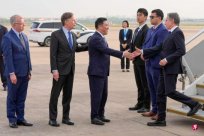
American scholars agreed that the biggest risk between the United States and China is no longer Taiwan, but the South China Sea, and the long -term is a dispute over scientific and technological.Some American scholars have pointed out that at the same time, Southeast Asian countries are also concerned about China's behavior in the South China Sea and the weakened investment in the United States, which has promoted regional military expenses to rise.
Sino -Artists attended the fifth "three -sided exchange" closed -door forum organized by Nanyang University of Technology on Tuesday (April 23) at the Nanyang University of Science and Technology's Rajelele South International Research Institute, and accepted local media interviews outside the venue.
Zack Cooper, a senior researcher at Washington Right -wing Think Tank American Enterprise Research Institute, said in a Lianhe Zaobao question that he believed that the biggest problem in Sino -US relations a year ago was Taiwan."(President of Taiwan) Lai Qingde will work one month later. I thought this would be the most worried issue of everyone, but at present, the South China Sea may be more worrying."
Cooper pointed out that as the situation of Ayunjin Reef (the Filipino -called Renai Reef) continued to deteriorate, no signs showed that Beijing was willing to give in, and the United States would stand with the Philippines anyway.
Senior Researcher and Director of National Defense Project Stacie Pettyjohn also pointed out that the current tensions of the South China Sea and Ayunjin Reef are the most serious challenges.The behavior of artillery was very angry, and the United States stated that the United States explicitly stated that it would defend the Philippines.
Cooper pointed out that China ’s behavior in Ayunjin Reef and the South China Sea is getting stronger and stronger, which obviously causes anxiety in the area.Southeast Asian countries are also concerned about the weakening of regional investment in the United States, and believes that they must pay more efforts to defend themselves to defend sovereignty, which means more defense expenditure.
He judged that there is no military reserve competition in Southeast Asia, but countries have paid more and more attention to their national defense. After decades of military expenses in China, they have begun to try to catch up.
Cooper expects that if China does not adjust its foreign policy and is still expected to enter the White House again at the end of the year, two factors may accelerate the growth rate of regional military budgets.
Zhou Bo, a researcher at the Strategic and Security Research Center of Tsinghua University, pointed out that although China's military expenditure this year has increased by about 7 % year -on -year, only about 1.5 % of GDP in the past decades, far lower than NATO standards.He believes that the Chinese defense budget is roughly unchanged, indicating that it keeps calm in the area and has not launched a military reserve competition with any party.
Petty John believes that scientific and technological competition is a long -term challenge facing Sino -US relations. The vital technology is not only the basis of economic development and military power, but also prompting various tools such as sanctions or even partial decourse.Affects the world.
On the occasion of US Secretary of State Brilling for three days this week , Chinese aesthetic scholars have evaluated that one of the high-level high-levels of the two countries has passed one in the past.The annual interactive exchanges are increasingly frequent, and the stability of bilateral relations has made the world "relieved."However, American scholars are pessimistic that US -China relations are currently stabilizing in the predicament, and the two countries are still different from many issues. Recent high -level visits have not achieved any major results, and they have not made any substantial progress in improving relations.
Cooper believes that the United States and China are still "deeply frustrated" in the stability of bilateral relations, and accus each other of each other with each other as competitors, but the two countries have not lost patience to high -level interaction.
Petty John also believes that although US -China relations have improved slightly in the past year, but there is no significant change, and the two countries may still refuse to discuss some issues with each other.She also pointed out that Beijing has a pre -example of cutting off and refusing to communicate with the United States. She hopes that this situation will not happen again when bilateral relations have improved slightly.
Zhou Bo pointed out that the two giants of China and the United States are increasingly interacting and discussing cooperation instead of being. "This makes everyone relieved."He pointed out that China and the United States have continued to emphasize that their own views have recently emphasized that their own views are "very natural", and "this shows that (both parties) need this communication."
The first "three -sided exchange" closed -door forum was held in 2021. This year is the second time that the participants include different national scholars and Singapore officials.
Wang Jingrong, Executive Vice Chairman of the Rajiery South International Research Institute, revealed in an interview that in the context of the recovery of high -level interaction between China and the United States, the exchange of scholars between the two countries is no longer so nervous compared to one year ago.And indifferent.He pointed out that the forum provides a frank opportunity to communicate with each other and listen to each other. I hope that this will also allow Singapore to play an important role in international relations, survival and economic diplomatic interaction.




